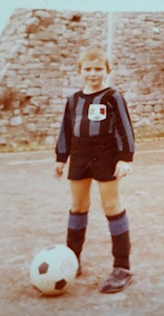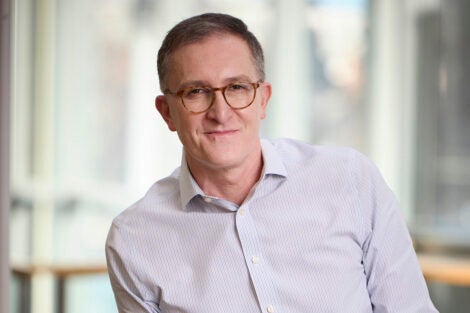March 19, 2024 – When Dean Andrea Baccarelli looks up from his desk, he sees a watercolor of an imaginary New York City restaurant: Baccarelli’s Pizzeria. The gift, painted by a former colleague, is a reminder of the “Plan B” he sketched out for himself decades ago. If academia didn’t work out, he decided, he’d open a pizzeria.
Baccarelli’s path to a career in public health never detoured into a pizza parlor, but it did take several twists and turns.

After his childhood dream of soccer stardom was dashed—“two left feet,” he explained—he thought about studying poetry or philosophy. He ended up applying to medical school, inspired by a presentation from a physician who had spent years serving patients in rural India. “I thought, ‘Let’s do something where I can really make a difference,’” Baccarelli recalled.
A few years later, a conversation with a leading Italian epidemiologist prompted him to enter public health. “In a one-hour meeting, we made a 20-year plan for the research we would do,” Baccarelli said.
He honed that research plan after another mentor began talking about the emerging field of epigenetics, which explores how environmental exposures and personal behaviors affect gene activity. Baccarelli, then an assistant professor at the University of Milan, recognized that this line of research could have profound implications for human health. So, he set about turning his three-person lab into an epigenetics powerhouse.
“We didn’t have a clue, to be honest,” he said. “We started without knowing what we were doing. We were brave and reckless.”
The risk paid off: Over the years, Baccarelli and his colleagues have broken new ground in epigenetics. They investigated a new epigenetic biomarker of aging that is strongly predictive of mortality, physical functioning, and diseases such as cancer and Alzheimer’s. They identified epigenetic changes driven by exposure to benzene, poor diet, and psychological stress, among other factors. Baccarelli has also conducted extensive research on the health impacts of air pollution; his data, along with research from Harvard Chan School, has led to tighter Environmental Protection Agency regulations.
Twenty years later, Baccarelli has embarked on yet another chapter, as dean of Harvard T.H. Chan School of Public Health.
It’s a homecoming: He worked here as a visiting scientist and then spent six years as an associate professor. In 2016, he left for New York to serve as chair of the Department of Environmental Health Sciences at the Columbia Mailman School of Public Health. He began his current role on Jan. 1.
As he re-introduces himself to the Harvard Chan community, Baccarelli recently sat down to share some personal stories:
Reflecting on his own “zigzag” career, Baccarelli offered this advice for public health students:
In recent weeks, Baccarelli has embarked on a listening tour to hear perspectives on both the challenges and the opportunities facing Harvard Chan School. As he plans for the future, he finds himself reflecting on his first impression upon arriving at the Longwood campus from Milan:
Baccarelli said he sees that same energy at Harvard Chan School now, along with a fierce determination to make a difference in a world facing numerous grave public health challenges.
Feature photo: Kent Dayton
Videos: Anna Webster
